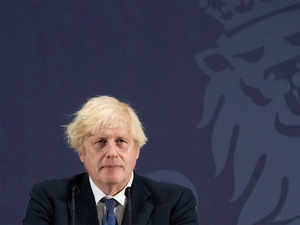 AFP
AFPGas stations closed, garbage collection canceled and supermarket shelves stripped bare of essential goods.
In a week when Prime Minister Boris Johnson promised England a return to normality after months of lockdown, a coronavirus-weary nation has instead been battered by a new crisis.
This one is being called the “pingdemic.”
With virus case numbers surging again, hundreds of thousands of people have been notified — or pinged — by a government-sponsored phone app asking them to self-isolate for 10 days because they were in contact with someone who had tested positive.
So many workers have been affected that some businesses have closed their doors or started a desperate search for new staff, and a political battle has erupted with the opposition Labour Party warning of “a summer of chaos” after contradictory statements from the government about how to respond if pinged.
Those notified by the app are not required by law to isolate, but the government’s official position is that it wants them to do so. On Thursday, it was planning to publish a list of critical workers to be exempted from self-isolation in order to keep things running.
That followed a warning from the mayor of London, Sadiq Khan, of possible disruption to the capital’s transportation network, food supplies and refuse collection services.
This was not what the government was hoping for when it lifted most coronavirus legal restrictions in England on Monday, a moment hailed as “Freedom Day.”
Johnson argues the country has good levels of protection because of its successful vaccine rollout.
But the relaxation coincided with a big spike in new cases, numbering around 40,000 a day, prompted by the highly infectious delta variant. Inevitably that has been reflected in the numbers of people being pinged; in the week of July 8-15, more than 600,000 alerts were issued by the app.
Supermarkets have warned of staff shortages, as have trucking firms, and the British Meat Processors Association said that 5%-10% of the workforce of some of its companies had been pinged.
To complicate matters, there are two parallel systems of coronavirus warnings in Britain.
In addition to the app, the government has a more traditional contact-tracing system, with a staff that calls people to warn that they may have been exposed. People instructed by phone to self-isolate are legally obliged to do so, whereas the app is purely advisory.
In a week when Prime Minister Boris Johnson promised England a return to normality after months of lockdown, a coronavirus-weary nation has instead been battered by a new crisis.
This one is being called the “pingdemic.”
With virus case numbers surging again, hundreds of thousands of people have been notified — or pinged — by a government-sponsored phone app asking them to self-isolate for 10 days because they were in contact with someone who had tested positive.
So many workers have been affected that some businesses have closed their doors or started a desperate search for new staff, and a political battle has erupted with the opposition Labour Party warning of “a summer of chaos” after contradictory statements from the government about how to respond if pinged.
Those notified by the app are not required by law to isolate, but the government’s official position is that it wants them to do so. On Thursday, it was planning to publish a list of critical workers to be exempted from self-isolation in order to keep things running.
That followed a warning from the mayor of London, Sadiq Khan, of possible disruption to the capital’s transportation network, food supplies and refuse collection services.
This was not what the government was hoping for when it lifted most coronavirus legal restrictions in England on Monday, a moment hailed as “Freedom Day.”
Johnson argues the country has good levels of protection because of its successful vaccine rollout.
But the relaxation coincided with a big spike in new cases, numbering around 40,000 a day, prompted by the highly infectious delta variant. Inevitably that has been reflected in the numbers of people being pinged; in the week of July 8-15, more than 600,000 alerts were issued by the app.
Supermarkets have warned of staff shortages, as have trucking firms, and the British Meat Processors Association said that 5%-10% of the workforce of some of its companies had been pinged.
To complicate matters, there are two parallel systems of coronavirus warnings in Britain.
In addition to the app, the government has a more traditional contact-tracing system, with a staff that calls people to warn that they may have been exposed. People instructed by phone to self-isolate are legally obliged to do so, whereas the app is purely advisory.
(Catch all the Business News, Breaking News, Budget 2024 Events and Latest News Updates on The Economic Times.)
Subscribe to The Economic Times Prime and read the ET ePaper online.
Read More News on
(Catch all the Business News, Breaking News, Budget 2024 Events and Latest News Updates on The Economic Times.)
Subscribe to The Economic Times Prime and read the ET ePaper online.





